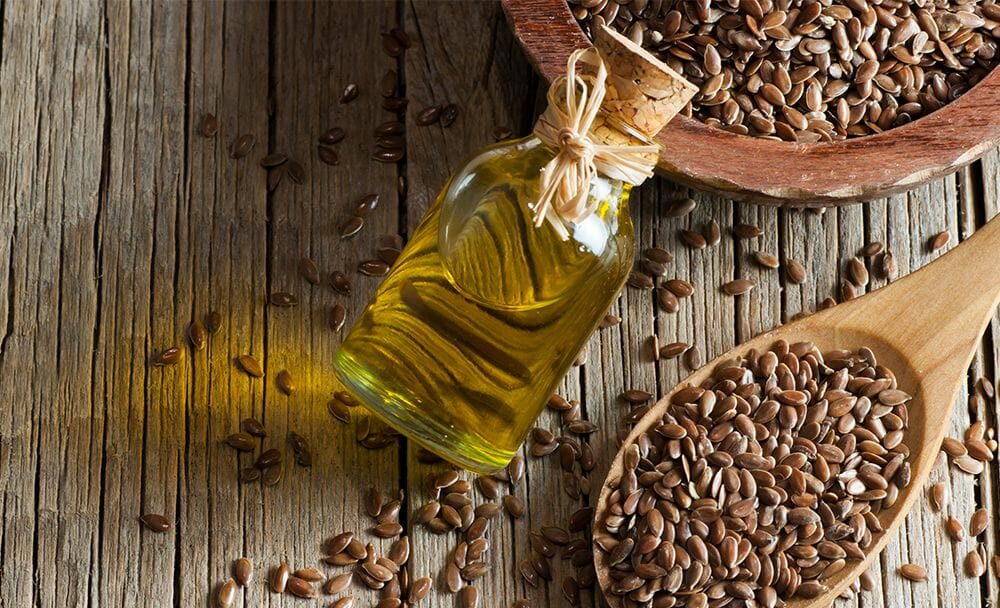
Flaxseed oil is derived from the flax (Linum usitatissimum) seeds, which are tiny brown seeds rich in nutrients. The oil from the seeds has gained significant popularity due to its potential health benefits and versatile uses. This oil is rich in essential nutrients and compounds that offer a range of potential advantages for overall well-being, such as in the reduction of cardiovascular disease, cancer, arthritis, osteoporosis, atherosclerosis, diabetes, autoimmune and neurological disorders. [1]
In this comprehensive exploration of flaxseed oil, we will delve into its nutritional composition, various benefits, common uses, potential side effects, and considerations for incorporating into a balanced lifestyle.
Nutritional Composition of Flaxseed Oil
Flaxseed oil is renowned for its nutritional richness, containing essential nutrients, healthy fats, and bioactive compounds. One of the primary components of flaxseed oil is alpha-linolenic acid (ALA), an omega-3 fatty acid. Omega-3 fatty acids are known for their major role in supporting cardiovascular health, reducing inflammation, and improving brain function.
Flaxseed oil also contains short-chain polyunsaturated fatty acids (PUFA), soluble and insoluble fibers, phytoestrogen lignans (secoisolariciresinol diglucoside-SDG), proteins, and an array of antioxidants. These nutritional compounds have been linked to potential benefits such as hormone regulation, reduced oxidative stress, and a lowered risk of certain chronic diseases. [1]
Flaxseed Oil & Ayurveda
In Ayurveda, Flaxseed Oil has been used for medicinal purposes since the times of Charaka.
Ayurvedic Qualities of Flaxseed Oil
· Laghu- Light and suitable for digestion
· Teekshna- Piercing
· Action- Kasahara, Kushtaghna, Balya
· Vipaka- Katu- Becomes pungent in taste after digestion
· Veerya-Ushna- hot potency
· Sara- Relieves constipation and improves mobility
· Impact on Doshas- Balances the Vata [3]
Ayurvedic Benefits of Flaxseed Oil
· Balya- Boosts immunity & strength
· Agneya- Hot and good for cough and cold
· Twaka Dosha Hara- Improve skin & oral health
· Malakrut- Adds bulk to feces and relieves constipation
· Vatahara- Treats imbalanced Vata and health issues like neuralgia, bloating, paralysis, etc, arising from it
· Grahi- Useful in treating IBS, Diarrhea [3]
Types of Ayurvedic treatment/therapy using Flaxseed Oil
· Basti Chikitsa (Administering Enema)
· Abhyanga (Massage Therapy)
· Karna Poorana (Ear drop therapy for earache)
· Nasaya (Nasal drop therapy for nasal congestion) [3]
Health Benefits of Flaxseed Oil
Heart Health:

The healthy omega-3 fatty acids in flaxseed oil contribute to cardiovascular health by reducing inflammation, supporting healthy cholesterol levels, and helping to regulate blood pressure. These effects collectively reduce the risk of heart disease. [1]
Skin Health:
Flaxseed possesses qualities similar to Madhura, aiding in the regulation of skin pH. It exhibits lubricating attributes akin to Picchaila, enhancing the suppleness and flexibility of the skin. It also promotes the skin’s moisture retention capacity, as denoted by the Grahi quality. Flaxseed possesses the ability to eliminate skin imperfections, acting as a Tvagdoshahrit. Flaxseed oil benefits for skin, including its ability to facilitate wound healing as a Vranahrit. It is beneficial in addressing Vata-related skin concerns such as dryness, undernourishment, and the absence of a radiant glow. [1]
Wound healing ability:
Flaxseed oil serves as a plentiful reservoir of vital fatty acids known as essential fatty acids (EFAs), including linoleic acid (omega-6) and α-linolenic acid (omega-3). These EFAs play a pivotal role in controlling the synthesis of prostaglandins, thereby initiating the process of wound healing. [1]
Treatment of Diabetes:
Flaxseed oil benefits include the presence of dietary fibers, lignans, and omega-3 fatty acids within flaxseed contribute to a safeguarding impact against the risk of diabetes. [1]
Hormone Balance:
Lignans found in flaxseed oil are phytoestrogens, which can help regulate hormone levels. Thus flaxseed oil benefits for females experiencing menopausal symptoms are immense. [1]
Cancer Prevention:
Some studies suggest that the lignans and omega-3 fatty acids in flaxseed oil have protective effects against certain types of cancer, particularly breast and prostate cancer. [1]
Other benefits:
Flaxseed oil is applied as a diuretic for addressing kidney disorders, as anti-tumoral measures, as well as for alleviating pain, cough, and inflammation, in treating gastrointestinal disorders and freckles, and for addressing issues related to nail health. [1]
Uses of Flaxseed Oil
Flaxseed oil can be utilized in various ways to harness its potential benefits:
Bakery products:

Flaxseed oil uses are mainly in baked food items such as bread and muffins as it is known to improve loaf volume and shelf life. The primary benefit of incorporating milled flaxseed into bakery products lies in its carbohydrate (gums) and protein components. It is also used in ready-to-eat breakfast cereals, breakfast drinks, salad dressings made with cold-pressed flaxseed oil, salad toppings, biscuits, meat extenders, crackers, soups, bagels, fiber bars, and cakes. [1]
Gluten-free option:
Since flaxseed lacks gluten, it can benefit individuals with a gluten allergy. In recipes for bread, muffins, pancakes, and cookies, whole or ground flaxseed can serve as a substitute for a portion of the flour. [1]
Cooking Oil Replacement:
Flaxseed oil can be used as finishing oil for drizzling on salads, or cooked dishes for an added nutritional boost. [1]
Considerations when using flaxseed oil
- Avoid the consumption of raw or unripe flaxseeds due to their potential content of harmful compounds.
- Flaxseed and supplements of flaxseed oil appear to be generally well tolerated in moderate quantities. Few instances of side effects have been reported.
- The safety of flaxseed intake during pregnancy is uncertain, as it may exert mild hormonal effects. However, substantial research on the impact of flaxseed on pregnancy outcomes is lacking. Some studies suggest that the use of flaxseed oil during the second or third trimester might elevate the risk of premature births. The safety of utilizing flaxseed while breastfeeding remains poorly understood.
- When incorporating flaxseed into your diet, much like any fiber supplement, it is advisable to consume it with ample water. Inadequate hydration could exacerbate constipation or, in rare cases, lead to intestinal blockages. Both flaxseed and flaxseed oil have the potential to induce diarrhea. [2]
FAQs
• What are some side effects of flaxseed oil?
Individuals with allergies to flaxseed or other members of the Linaceae family should exercise caution when using flaxseed oil. Allergic reactions can range from quite mild reactions to severe ones.
Some individuals may experience digestive discomfort when consuming flaxseed oil in large quantities. Starting with a small amount and gradually increasing intake can help prevent gastrointestinal issues.
While omega-3 fatty acids are beneficial, maintaining an ideal balance between omega-3 fatty acid and omega-6 fatty acid is essential. An excessive intake of omega-6 fatty acids, often found in several processed foods, can lead to an imbalance and potential health issues.
Flaxseed oil can interact with certain medications, including blood thinners and antiplatelet drugs. It is important to consult a healthcare professional before adding flaxseed oil to your routine, especially if you are taking prescription medications.
Flaxseed oil is calorie-dense, so it is essential to moderate your intake to avoid excess calorie consumption.
• What are the flaxseed oil benefits for hair?
Flaxseed oil can be applied topically to moisturize and nourish the hair or skin. It is also used in hair care products for its potential to promote healthy hair growth and reduce scalp inflammation.
• How to consume Atasi taila or flaxseed oil in Hindi?
You can take a teaspoon of the oil and mix it with hot or cold cereal or simply have it along with water like any other medication. It can also be consumed in baked products such as cookies and breads.
Conclusion:
Flaxseed oil is a valuable addition to a balanced diet, offering a range of potential health benefits due to its omega-3 fatty acids, lignans, and other essential nutrients. From promoting heart health and reducing inflammation to supporting skin health, flaxseed oil’s versatility makes it a sought-after component of a health-conscious lifestyle. Whether used as a dietary supplement, cooking oil replacement, or flaxseed oil for hair, it has the potential to enhance overall well-being.
Disclaimer:
This article is written from a health and wellness perspective and is not medical advice. Kindly seek the help of a certified medical practitioner before initiating any treatment.
References:
- Flax and flaxseed oil: an ancient medicine & modern functional food
- Flaxseed and Flaxseed Oil
- Flaxseed, Flaxseed Oil Uses, Dose, Research, Side Effects
Make Your Salads and Starters Fun with Some New Ayurvedic Recipes (Download Ebook)













